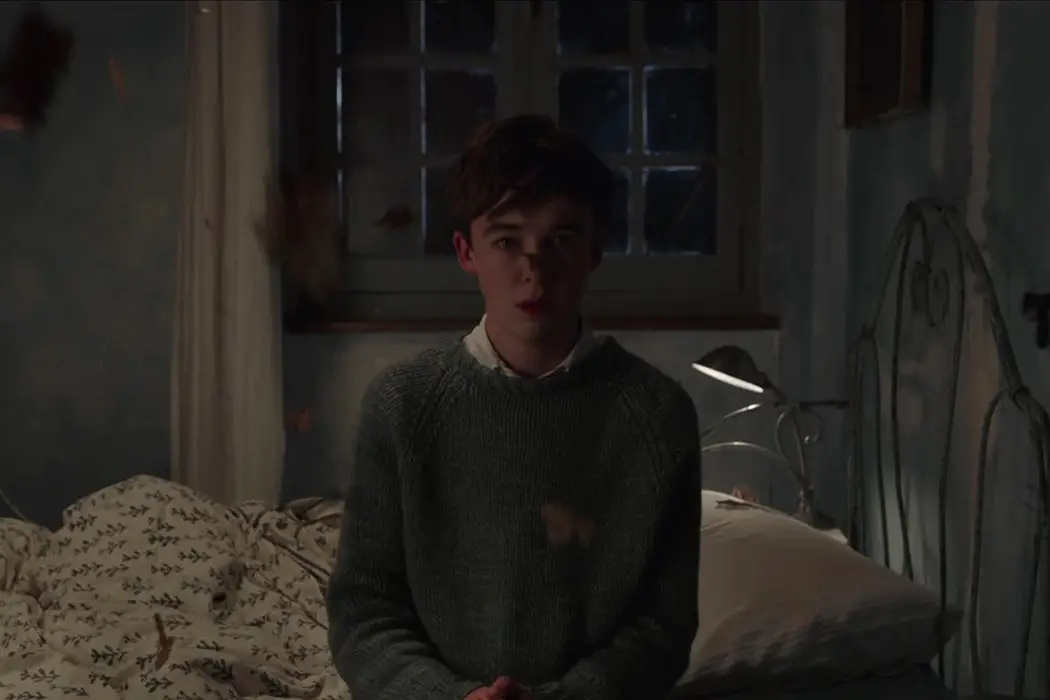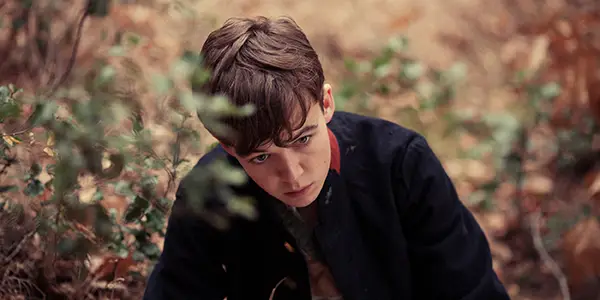DEPARTURE: A Love Story With An Identity Crisis

Ryan has a degree in Film & TV Production. He…
Andrew Stegall‘s Departure opens with a sequence that feels more like a trailer for the film we’re about to see than an actual introduction to its story and characters. It has Elliott (Alex Lawther) talking about how, sometimes, he feels as if he knows something is going to happen, even before it does. It’s narrated over footage of him and his mother (Juliet Stevenson) driving to their house in the French countryside, every shot punctuated with a black screen. You get the impression it’s intended to feel thoughtful and poignant and interesting, but instead it feels forced.
It’s also a pretty apt way for Departure to begin, as it leaves you with a feeling of perplexity and confusion that will become all too familiar over the next 107 minutes. Elliott and his mother Beatrice go to this French house during the summer; it’s almost like a holiday home for them despite Beatrice’s insistence that they aren’t on holiday. Shortly after they arrive, Elliott goes for a walk and stumbles across Clément (Phénix Brossard) going for a swim in the nearby reservoir. Elliott is immediately drawn to him and the two form a quick friendship, while Elliott secretly longs for something more.
Something New?
On paper, this sounds incredibly conventional. Homosexuality is tackled frequently in coming-of-age cinema. I mean, Moonlight is the talk of the town right now, and even Blue is the Warmest Colour doesn’t feel all that long ago. It becomes evident very early on in Departure that it needs to do one of two things: it either needs to break the mould and try something new, or it needs to embrace conventionality and use it to its own advantage. Ultimately, it does neither.

It’s deeply frustrating, because there’s a lot of material here that could work if a bit more thought was put into the way it’s handled – in fact, a handful of great scenes sporadically crop up across the film. There’s a nicely written dialogue piece in a café between Elliott and the owner, in which Elliott talks about his poetry and the owner replies by revealing that he used to be an actor. Another moment later on features Elliott desperately trying to keep the conversation rolling as Clément is about to go home; Clément says goodbye to Elliott and exits the frame, leaving the camera to linger on Elliott for another thirty seconds as he turns around and heads home himself. The pair’s first conversation is even shown through a curtain, leaving us to watch their silhouettes as they meet for the first time.
An Uneven Mix
For all of the film’s solid moments, though, it doesn’t take long before something else rolls around that offsets what worked and pushes Departure back into unstable territory. It repeatedly returns to the same piano melody between scenes, and the result is more irritating than melancholic. Characters frequently give in to clichés: Elliott runs his hands across walls as he walks slowly through the town; characters sit on opposite ends of benches for no reason other than forcing the camera to find an unusual angle; Elliott even takes up smoking to impress Clément, and the ensuing scene is laughable in just how obvious it feels. Frequently, moments that should feel warming and touching feel laboured by the film’s refusal to tackle anything new.

There’s also a case of the film’s occasional visual metaphors. They feel woefully unnecessary even to begin with – Elliott is a poet who mostly speaks his mind, why the film needs to resort to visual trickery is confusing – but the fact that they fluctuate in quality doesn’t help matters either. A shot of Elliott sitting alone in his bed as autumn leaves fall around him is stunning, especially when coupled with an earlier line from Beatrice about the orange leaves being the element that originally made her fall in love with the house. Less successful is the film’s frequent drowning metaphors; we repeatedly watch as Elliott slowly falls through water and never really understand why the film needs us to see this.
Identity Crisis
Where Departure‘s biggest issues lie, though, are in its confusion as to what it really wants to be. The film skips over any awkwardness between Elliott and Clément, they become friends immediately. It’s a nice little twist on the norm but it ultimately sacrifices character development on Elliott’s part – there’s little growth to him across the film, and character growth is vital for a coming-of-age story. When Departure brings Elliott’s father into the mix in the final act, the film seems to shift gears into familial drama territory, but can’t fully commit to this either. We’re left with a film that flits between the genres without ever tying the two together.

To its credit, Departure handles Elliott and Clément’s friendship well enough – it’s hardly groundbreaking, but when the family drama is sidelined and scenes can feature just the two of them, we tend to find Departure at its most engaging. Elliott’s emotions aren’t particularly fleshed out, but when the two come together on screen it’s enough to subside this.
A moment between the two of them on a boat moves smoothly from a playful prank into their first real intimate moment, and it’s handled with delicacy and adoration. It certainly isn’t enough to push aside the film’s flaws, but when Elliott and Clément are allowed to simply be with each other and not talk about their feelings or emotions, Departure starts to find a path – it’s just a shame these scenes feel as if they’re over before they even begin.
Conclusion
There’s unfortunately a lot wrong with Departure. Its visual metaphors are flimsy, its characters are lacking in the growth the film requires of them, most of the emotional moments fall flat, and the film itself suffers from a severe case of identity crisis. Lawther, Brossard and Stevenson give good performances, but they unfortunately can’t save Departure from itself.
Ultimately, Departure doesn’t do anything that hasn’t been done before, and what it does do isn’t enough for us to overlook that.
So, what do you think? Does Departure‘s coming-of-age and family drama fusion work for you? Or did it also leave you feeling muddled? Let us know in the comments!
Departure was released on March 7th, 2017 in the U.S. and Canada.
Does content like this matter to you?
Become a Member and support film journalism. Unlock access to all of Film Inquiry`s great articles. Join a community of like-minded readers who are passionate about cinema - get access to our private members Network, give back to independent filmmakers, and more.
Ryan has a degree in Film & TV Production. He has written about all things film and TV on his own blog, www.morrismovies.co.uk, for five years. His favourite film is Inception, as it's kind of the one that drew him into cinema in the first place. If you're one of those people who think Christopher Nolan is overrated, he probably doesn't like you. He isn't sorry.












